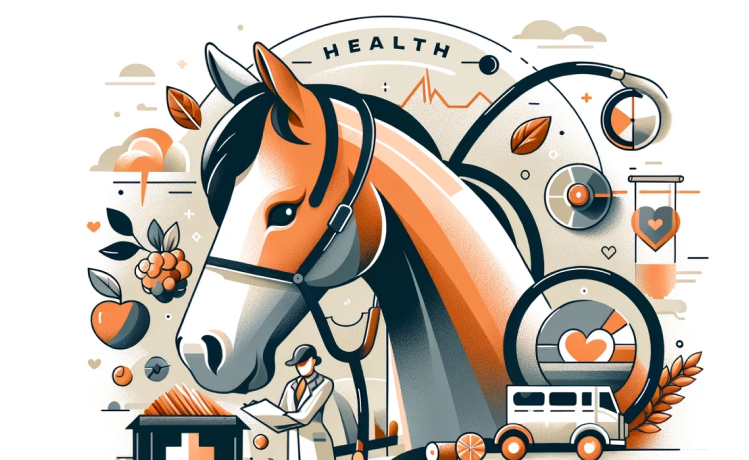Horse Health: Recognizing and Treating Common Equine Ailments

Horse health is a top priority for every owner, whether you're a casual rider or a professional competitor. As a large herbivore, horses are susceptible to a range of health issues, including digestive problems, respiratory illnesses, and joint injuries. Understanding these common equine ailments and knowing how to recognize and treat them is crucial to keeping your horse healthy and happy. In this comprehensive guide, we'll explore some of the most common equine ailments and offer expert advice on how to manage them.
Digestive Problems
One of the most common equine ailments is digestive problems, which can manifest in several ways. These include colic, gastritis, and ulcers. Colic occurs when there is a blockage in the intestines, causing pain and discomfort. Gastritis refers to inflammation of the stomach lining, often caused by excessive acid production. Ulcers occur when the stomach lining becomes damaged, leading to pain and discomfort.
To recognize signs of digestive problems, look for changes in your horse's behavior, appetite, and feces. Signs of colic include stretching, bucking, and kicking. Gastritis can cause loss of appetite, weight loss, and diarrhea. Ulcers can lead to chronic pain, weight loss, and difficulty eating.
If you suspect your horse is experiencing digestive problems, contact your veterinarian immediately. They may recommend dietary changes, medication, or surgery depending on the severity of the issue.
Respiratory Illnesses
Another common equine ailment is respiratory illnesses, which can affect your horse's breathing and overall health. Respiratory illnesses can be caused by viruses, bacteria, or other environmental factors, such as dust and mold. Symptoms of respiratory illnesses include coughing, wheezing, nasal discharge, and decreased energy levels.
To prevent respiratory illnesses, ensure your horse lives in a clean and well-ventilated environment. Regularly clean and disinfect stalls, bedding, and equipment. Provide fresh air and exercise opportunities, and monitor your horse's breathing regularly.
If you notice symptoms of respiratory illnesses, seek medical attention immediately. Your veterinarian may prescribe antibiotics or antiviral medications, or recommend additional testing to determine the root cause of the problem.
Joint Injuries
Joint injuries are another common equine ailment, affecting many horses throughout their lifetime. Joint injuries can occur due to trauma, wear and tear, or degenerative diseases. Common joint injuries include arthritis, tendonitis, and ligament sprains.
Signs of joint injuries include limping, swelling, heat, and decreased mobility. If you suspect your horse is experiencing a joint injury, seek immediate medical attention. Your veterinarian may recommend physical therapy, medication, or surgery to alleviate pain and restore function.
Prevention is key when it comes to joint injuries. Ensure your horse receives proper nutrition and exercise, and maintain a healthy weight. Regularly check your horse's feet and tack for signs of wear and tear, and address any issues promptly.
Skin Conditions
Skin conditions are another common equine ailment, affecting many horses throughout their lifetime. Skin conditions can be caused by allergies, parasites, or hormonal imbalances. Common skin conditions include hives, sweet itch, and rain rot.
Symptoms of skin conditions include redness, itching, flaking, and odor. If you notice signs of a skin condition, seek medical attention immediately. Your veterinarian may prescribe medication, recommend topical treatments, or perform additional tests to determine the root cause of the problem.
Proper nutrition and hygiene are key to preventing skin conditions. Feed your horse a balanced diet rich in omega-3 fatty acids, and provide access to clean water and shelter. Regularly groom your horse, paying special attention to sensitive areas like the ears and face.
Mental Health Issues
Mental health issues are becoming increasingly recognized as a common equine ailment. Stress, anxiety, and depression can affect your horse's behavior, appetite, and overall well-being. Mental health issues can be caused by a range of factors, including changes in routine, separation anxiety, and pain.
Recognizing signs of mental health issues in your horse can be challenging, but pay attention to changes in behavior, appetite, and activity level. If your horse becomes withdrawn, aggressive, or lethargic, it may be indicative of a mental health issue.
Seek medical attention immediately if you suspect your horse is experiencing a mental health issue. Your veterinarian may recommend medication, counseling, or other therapies to help your horse cope with stress and anxiety.
Vaccinations and Parasite Control
Vaccinations and parasite control are critical components of maintaining your horse's overall health. Vaccinations protect against infectious diseases, while parasite control helps prevent the spread of disease and promotes optimal health.
Your veterinarian will recommend a vaccination schedule based on your horse's age, breed, and exposure risk. Regular deworming and flea treatment are also necessary to prevent infestations and the transmission of disease.
Conclusion
Keeping your horse healthy requires ongoing care and attention to common equine ailments. By recognizing signs of digestive problems, respiratory illnesses, joint injuries, skin conditions, mental health issues, and implementing effective prevention strategies, you can help your horse live a long and healthy life. Remember to consult with your veterinarian regularly to ensure your horse receives the best possible care.
With the right knowledge and resources, you can play an active role in promoting your horse's health and well-being. By prioritizing your horse's needs and building a strong bond with them, you'll enjoy years of happiness and fulfillment together.




